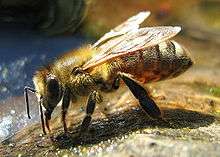Definify.com
Webster 1913 Edition
Bee
Bee
Webster 1828 Edition
Bee
BEE
,Definition 2026
Bee
bee
bee
English
Noun
bee (plural bees)
- A flying insect, of the superfamily Apoidea, known for its organised societies and for collecting pollen and (in some species) producing wax and honey.
- 1499, John Skelton, The Bowge of Courte:
- His face was belymmed as byes had him stounge […].
- 1590, Edmund Spenser, The Faerie Queene, III.12:
- An angry Wasp th'one in a viall had, / Th'other in hers an hony-laden Bee.
- 1603, John Florio, translating Michel de Montaigne, Essayes, London: Edward Blount, OCLC 946730821, II.12:
- Can there be a more formall, and better ordered policie, divided into so severall charges and offices, more constantly entertained, and better maintained, than that of Bees?
- 2012, ‘Subtle poison’, The Economist, 31 March:
- Bees pollinate many of the world’s crops—a service estimated to be worth $15 billion a year in America alone.
- 1499, John Skelton, The Bowge of Courte:
Derived terms
Synonyms
- (flying insect of the order Hymenoptera): king of insects
Translations
|
|
See also
Etymology 2
Possibly from dialectal English bene, been, bean (“help given by neighbours”), from Middle English been, bene (“neighbourly help, prayer, petition, request, extra service given by a tenant to his lord”),[1][2] from Old English bēn (“prayer, request, petition, favour, compulsory service”) from Proto-Germanic *bōniz (“prayer, request, supplication”), from Proto-Indo-European *bʰeh₂- (“to say, speak”). Cognate with Danish bøn (“prayer”), Dutch ban (“curse”), German Bann (“ban”). More at ban.
Noun
bee (plural bees)
- A contest, especially for spelling; see spelling bee.
- geography bee
- A gathering for a specific purpose, e.g. a sewing bee or a quilting bee.
- S. G. Goodrich
- The cellar […] was dug by a bee in a single day.
- 2011, Tim Blanning, "The reinvention of the night", Times Literary Supplement, 21 Sep 2011:
- Particularly resistant, for example, in many parts of northern Europe was the “spinning bee”, a nocturnal gathering of women to exchange gossip, stories, refreshment and – crucially – light and heat, as they spun wool or flax, knitted or sewed.
- S. G. Goodrich
Translations
Etymology 3
(Northern development of) Old English bēah.
Noun
bee (plural bees)
- (obsolete) A ring or torque; a bracelet.
- 1485, Sir Thomas Malory, Le Morte Darthur, Book VII:
- And Kynge Arthure gaff hir a ryche bye of golde; and so she departed.
- 1658, Sir Thomas Browne, Urne-Burial, Penguin 2005, page 16:
- ...restoring unto the world much gold richly adorning his Sword, two hundred Rubies, many hundred Imperial Coynes, three hundred golden Bees, the bones and horseshoe of his horse enterred with him...
- 1485, Sir Thomas Malory, Le Morte Darthur, Book VII:
Etymology 4
Variant spellings.
Verb
bee
- Obsolete spelling of be
- 1604 Reverend Cawdrey Table Aleph
- held that a ‘Nicholaitan is an heretike, like Nicholas, who held that wiues should bee common to all alike.’
- 1604 Reverend Cawdrey Table Aleph
- (obsolete) past participle of be; been
- (Can we find and add a quotation of Spenser to this entry?)
Etymology 5
From Middle English, from Old English be, from Latin be (the name of the letter B).
Noun
bee (plural bees)
See also
- (Latin-script letter names) letter; a, bee, cee, dee, e, ef, gee, aitch, i, jay, kay, el, em, en, o, pee, cue, ar, ess, tee, u, vee, double-u, ex, wye, zee/zed (Category: en:Latin letter names)
Translations
|
|
Etymology 6
Probably from Old English bēah (“ring”). Compare bow.
Noun
bee (plural bees)
- (nautical, chiefly plural) Any of the pieces of hard wood bolted to the sides of the bowsprit, to reeve the fore-topmast stays through.
Synonyms
- bee block
References
- ↑ http://education.yahoo.com/reference/dictionary/entry/bee
- ↑ http://www.merriam-webster.com/dictionary/bee%5B3%5D
Estonian
Noun
bee (genitive [please provide], partitive [please provide])
Finnish
Pronunciation
- IPA(key): /ˈbeː/
- Rhymes: -eː
Noun
bee
Declension
| Inflection of bee (Kotus type 18/maa, no gradation) | |||
|---|---|---|---|
| nominative | bee | beet | |
| genitive | been | beiden beitten |
|
| partitive | beetä | beitä | |
| illative | beehen | beihin | |
| singular | plural | ||
| nominative | bee | beet | |
| accusative | nom. | bee | beet |
| gen. | been | ||
| genitive | been | beiden beitten |
|
| partitive | beetä | beitä | |
| inessive | beessä | beissä | |
| elative | beestä | beistä | |
| illative | beehen | beihin | |
| adessive | beellä | beillä | |
| ablative | beeltä | beiltä | |
| allative | beelle | beille | |
| essive | beenä | beinä | |
| translative | beeksi | beiksi | |
| instructive | — | bein | |
| abessive | beettä | beittä | |
| comitative | — | beineen | |
Usage notes
- Speakers often use the corresponding forms of b-kirjain ("letter B, letter b") instead of inflecting this word, especially in plural.
Synonyms
Latin
Interjection
bee!
- baa (sound of a sheep)
References
- bee in Charlton T. Lewis and Charles Short (1879) A Latin Dictionary, Oxford: Clarendon Press
Manx
Noun
bee m (genitive singular [please provide], plural [please provide])
Mutation
| Manx mutation | ||
|---|---|---|
| Radical | Lenition | Eclipsis |
| bee | vee | mee |
| Note: Some of these forms may be hypothetical. Not every possible mutated form of every word actually occurs. | ||
Verb
bee
Navajo
Pronunciation
- IPA(key): [beː]
Postposition
bee
- with, by means of, by means of it
Inflection
Tetum

Etymology
From Proto-Central Malayo-Polynesian *waiʀ, from Proto-Central-Eastern Malayo-Polynesian *waiʀ, from Proto-Malayo-Polynesian *wahiʀ.
Alternative forms
Noun
bee
- water (clear liquid H₂O)
